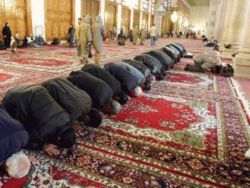Five Pillars of Islam
2008/9 Schools Wikipedia Selection. Related subjects: Philosophy
Five Pillars of Islam (Arabic: أركان الإسلام) is the term given to the five duties incumbent on every Muslim. These duties are:
1) Shahadah (profession of faith)
2) Salat (ritual prayer five times each day)
3) Sawm (fasting during Ramadan)
4) Zakat (charity given to the needy)
5) Hajj (pilgrimage to Mecca).
These practices are essential to Sunni Islam. Shi'a Muslims subscribe to eight ritual practices which substantially overlap with the Pillars.
The concept of five pillars is taken from the Hadith collections, notably those of Sahih Al-Bukhari and Sahih Muslim. The Qur'an does not speak of five pillars, although one can find in it scattered references to their associated practices.
The five pillars
Shahadah
The Shahadah (Arabic: شهادة transliteration: Šahādah) is the basic creed or tenet of Islam (Submission): "'ašhadu 'al-lā ilāha illā-llāhu" (see how is the Shahada in Quran Chapter 3, verse 18), or "I testify that there is no god except God". As the most important pillar, this testament is the foundation of Islam. Ideally, it is the first words children are taught as soon as they are able to understand it. Muslims (which is the arabic word for submitters) must repeat the shahadah in their five daily prayers called Salat (Contact Prayers).
Allah bears witness that there is no god but He, and (so do) the angels and those possessed of knowledge, maintaining His creation with justice; there is no god but He, the Mighty, the Wise.
Belief in One and Only God, constitutes the very foundation of Islam. There is no deity except God. He is indivisible and absolutely transcendent. God is the Almighty, the Creator and the Sustainer of the universe, Who is similar to nothing and nothing is comparable to Him. The basic message of Islam is that God and His creation are distinctly different entities. Neither is God His creation or a part of it, nor is His creation Him or a part of Him. This might seem obvious, but, man's worship of creation instead of the Creator is to a large degree based on ignorance of this concept. The worship of a so-called earthly representation or any other entity than God is clearly idol worship in the light of Quran's teachings (and the previous scriptures'), shirk (polytheism) is the only unforgivable sin in the Hereafter, while all the other sins may be forgiven.
Say: He is God, the One and Only; God, the Eternal, Absolute;He begets not, nor is He begotten; And there is none like unto Him. (Surah 112) God is He, than Whom there is no other god;- Who knows(all things) both secret and open; He, Most Gracious, Most Merciful. God is He, than Whom there is no other god;- the Sovereign, the Holy One, the Source of Peace (and Perfection), the Guardian of Faith, the Preserver of Safety, the Exalted in Might, the Irresistible, the Supreme the holy and everlating: Glory to God! (High is He) above the partners they attribute to Him.He is God, the Creator, the Evolver, the Bestower of Forms (or Colors).
Salat
The second pillar of Islam is Salat, the requirement to pray five times a day at fixed times. The time of day to pray are at dawn, noon, mid-afternoon, sunset, and night fall. Each salat is performed facing towards the Kaaba (the black stone of a pre-Islamic ritual) in Makkah. Salat is intended to focus the mind on Allah; it is seen as a personal communication with god, expressing gratitude and worship. According to the Qur'an, the benefit of prayer "restrains [one] from shameful and evil deeds".
Salat is compulsory but some flexibility in the specifics is allowed depending on the circumstances. For example, in the case of sickness or a lack of space, a worshipper can offer salat while sitting, or even lying down, and the prayer can be shortened when travelling. The salat must be performed in the Arabic language to the best of each worshipper's ability. If s/he cannot speak Arabic, then his/her native language can be used. The lines of prayer are to be recited by heart (although beginners may use written aids), and the worshipper's body and clothing, as well as the place of prayer, must be cleansed.
All prayers should be conducted within the prescribed time period ( waqt) and with the appropriate number of units ( raka'ah). While the prayers may be made at any point within the waqt, it is considered best to begin them as soon as possible after the call to prayer is heard.
Zakat
Zakat is the practice of charitable giving by Muslims based on accumulated wealth, and is obligatory for all who are able to do so. It is considered to be a personal responsibility for Muslims to ease economic hardship for others and eliminate inequality. Zakat consists of spending a fixed portion of one's wealth for the benefit of the needy, including, debtors and travelers. A muslim may also donate more as an act of voluntary charity, in order to achieve additional divine reward.
Zakat covers money made in business, savings, income, and so on. In current usage zakat is treated as a 2.5% levy on most valuables and savings held for a full year, as long as the total value is more than a basic minimum known as three or 87.48g of gold). As of , nisab is approximately 1,750 or an equivalent amount in any other currency. Many Shi'ites are expected to pay an additional amount in the form of a tax, which they consider to be a separate ritual practice.
Sawm

Three types of fasting ( Sawm) are recognized by the Qur'an: Ritual fasting,[ 2:183-187] fasting as compensation or repentance,[ 2:196] and ascetic fasting.[ 33:35]
Ritual fasting is an obligatory act during the month of Ramadan as is abstinence from sin. The fast is meant to allow Muslims to seek nearness to Allah, to express their gratitude to and dependence on him, to atone for their past sins, and to remind them of the needy. During Ramadan, Muslims are also expected to put more effort into following the teachings of Islam by refraining from violence, anger, envy, greed, lust, harsh language, gossip and to try to get along with each other better than normal. In addition, all obscene and irreligious sights and sounds are to be avoided.
Fasting during Ramadan is not obligatory for several groups for whom it would be excessively problematic. These include pre-pubescent children, those with a medical condition such as diabetes, elderly people, and pregnant or breastfeeding women. Observing fasts is not permitted for menstruating women. Other individuals for whom it is considered acceptable not to fast are those in combat and travellers. Missing fasts usually must be made up soon afterwards, although the exact requirements vary according to circumstance.
Many Muslims break their fast with a date because it is claimed, Muhammed broke his fast with a date.
Hajj
The Hajj is a pilgrimage that occurs during the Islamic month of Dhu al-Hijjah in the city of Makkah and derives from an ancient Arab practice. Every able-bodied Muslim is obliged to make the pilgrimage to Makkah at least once in their lifetime if they can afford it. When the pilgrim is around ten kilometers from Makkah, he must dress in Ihram clothing, which consists of two white sheets. The main rituals of the Hajj include walking seven times around the Kaaba, touching the Black Stone, traveling seven times between Mount Safa and Mount Marwah, and symbolically stoning the Devil in Mina.
The pilgrim, or the haji, is honoured in their community. For some, this is an incentive to perform the Hajj. Islamic teachers say that the Hajj should be an expression of devotion to Allah, not a means to gain social standing. The believer should be self-aware and examine their intentions in performing the pilgrimage. This should lead to constant striving for self-improvement.
Shia viewpoint
According to Shia doctrine, what is referred to as pillars by Sunni Islam are called the practices or secondary principles (Firoo e Din). The additional pillars according to Shia Islam are the following and are considered essential to the religion of Islam. The first is "Khums" which is a tax like Zakat and is for the descendants of Fatima (SA) and Ali (AS), next is jihad, which is also important to the Sunni, but not considered a pillar. The third is Amr-Bil-Ma'rūf, the "Enjoining to Do Good", which calls for every Muslim to live a virtuous life and to encourage others to do the same. The fourth is Nahi-Anil-Munkar, the "Exhortation to Desist from Evil", which tells Muslims to refrain from vice and from evil actions and to encourage others to do the same.
